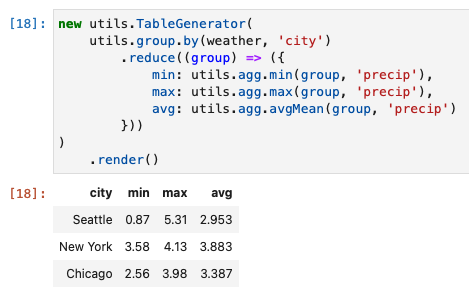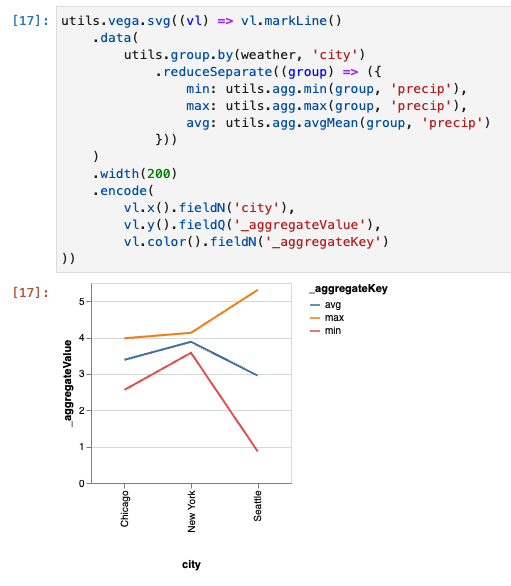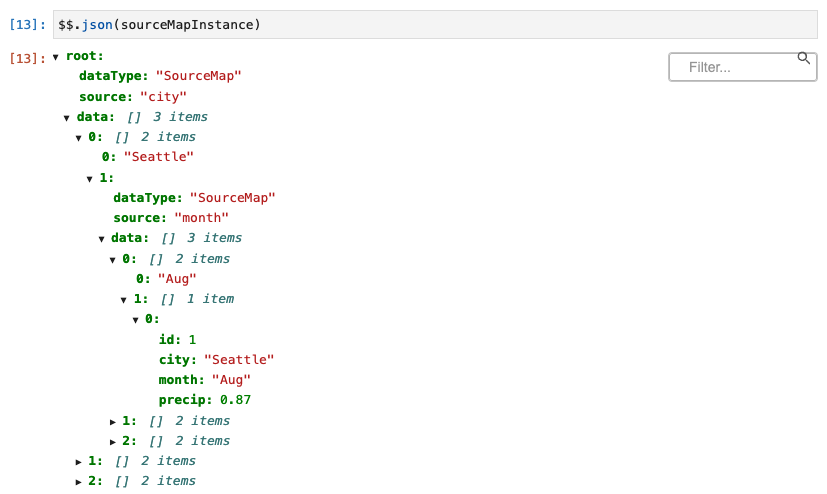Constructor
new SourceMap()
Members
source :String
The property the map was sourced from
Type:
- String
Methods
getSource() → {String}
Getter for the source
Returns:
- Type
- String
map(mapFn) → {SourceMap}
Maps a collection within the sourceMap by a function.
Note that this only maps the leaf collection of values, not the intermediary levels.
This can be useful from everything from:
- sorting the leaf collections,
- filtering the results to only those that meet certain criteria,
- to an alternative form of reducing the values,
- or even combinations of the three or more:
Example
const data = [
weather = [
{ id: 1, city: 'Seattle', month: 'Aug', precip: 0.87, dateTime: new Date(2020, 7, 1) , year: 2020},
{ id: 2, city: 'Seattle', month: 'Dec', precip: 5.31, dateTime: new Date(2020, 11, 1) , year: 2020},
{ id: 0, city: 'Seattle', month: 'Apr', precip: 2.68, dateTime: new Date(2021, 3, 1) , year: 2021},
{ id: 4, city: 'New York', month: 'Aug', precip: 4.13, dateTime: new Date(2020, 7, 1) , year: 2020},
{ id: 5, city: 'New York', month: 'Dec', precip: 3.58, dateTime: new Date(2020, 11, 1) , year: 2020},
{ id: 3, city: 'New York', month: 'Apr', precip: 3.94, dateTime: new Date(2021, 3, 1) , year: 2021},
{ id: 7, city: 'Chicago', month: 'Aug', precip: 3.98, dateTime: new Date(2020, 7, 1) , year: 2020},
{ id: 8, city: 'Chicago', month: 'Dec', precip: 2.56, dateTime: new Date(2020, 11, 1) , year: 2020},
{ id: 6, city: 'Chicago', month: 'Apr', precip: 3.62, dateTime: new Date(2021, 3, 1) , year: 2021}
];
utils.group.by(weather, 'city')
.map(collection => collection.length);
// SourceMap(3) [Map] {
// 'Seattle' => 3,
// 'New York' => 3,
// 'Chicago' => 3,
// source: 'city'
// }
utils.group.by(weather, 'city')
.map(collection => collection.filter(r => r.year === 2020))
.map(collection => collection.length);
// SourceMap(3) [Map] {
// 'Seattle' => 2,
// 'New York' => 2,
// 'Chicago' => 2,
// source: 'city'
// }Parameters:
| Name | Type | Description | |||||||||
|---|---|---|---|---|---|---|---|---|---|---|---|
mapFn |
function | {(array) => any} Function to apply to the leaf collections (arrays) Properties
|
Returns:
- New SourceMap with the leaf collections updated to the results from mapFn
- Type
- SourceMap
reduce(reduceFn) → {Array}
- See:
-
- reduceSeparate() - for separate objects - useful for vega charts
Reduces a SourceMap by groups, to a collection of objects that can be printed.
Note that the ReduceFn is called at the grouped collection of records level, not the entire collection.
This can be very helpful when working with tables.
new utils.TableGenerator(
utils.group.by(weather, 'city')
.reduce((group) => ({
min: utils.agg.min(group, 'precip'),
max: utils.agg.max(group, 'precip'),
avg: utils.agg.avgMean(group, 'precip')
}))
)
.render()

Example
collection = [
{ id: 1, city: 'Seattle', month: 'Aug', precip: 0.87 },
{ id: 0, city: 'Seattle', month: 'Apr', precip: 2.68 },
{ id: 3, city: 'New York', month: 'Apr', precip: 3.94 },
{ id: 4, city: 'New York', month: 'Aug', precip: 4.13 }
];
utils.group.by(collection, 'city')
.reduce((records) => {
min: utils.aggregate.min('precip'),
max: utils.aggregate.min('precip'),
avg: utils.aggregate.avgMean('precip')
});
//-- results
[{ city: 'Seattle', min: 0.87, max: 2.68, avg: 1.78 },
{ city: 'New York', min: 3.94, max: 4.13, avg: 4.06 }];Parameters:
| Name | Type | Description | |||||||||
|---|---|---|---|---|---|---|---|---|---|---|---|
reduceFn |
function | (collection, props) => {Object} - Function that reduces the collection to an object Properties
|
Returns:
- Array of objects merged with the parent group attributes and reduceFn result
- Type
- Array
reduceSeparate(reduceFn) → {Array}
- See:
-
- reduce() - for a compact object with multiple aggregate values, useful for tables
Reduces, but puts each aggregate value on a separate record.
This is particularly useful for charting vega, as series must be on separate objects.
Each object then made per group leaf collection, preserving the groups used to make it.
The object generated by the function is then merged.
utils.vega.svg((vl) => vl.markLine()
.data(
utils.group.by(weather, 'city')
.reduceSeparate((group) => ({
min: utils.agg.min(group, 'precip'),
max: utils.agg.max(group, 'precip'),
avg: utils.agg.avgMean(group, 'precip')
}))
)
.width(200)
.encode(
vl.x().fieldN('city'),
vl.y().fieldQ('_aggregateValue'),
vl.color().fieldN('_aggregateKey')
));

Example
utils.group.by(weather, 'city')
.reduceSeparate((group) => ({
min: utils.agg.min(group, 'precip'),
max: utils.agg.max(group, 'precip'),
avg: utils.agg.avgMean(group, 'precip')
}));
//-- results
[
{ city: 'Seattle', _aggregateKey: 'min', _aggregateValue: 0.87 },
{ city: 'Seattle', _aggregateKey: 'max', _aggregateValue: 5.31 },
{ city: 'Seattle', _aggregateKey: 'avg', _aggregateValue: 2.953 },
{ city: 'New York', _aggregateKey: 'min', _aggregateValue: 3.58 },
{ city: 'New York', _aggregateKey: 'max', _aggregateValue: 4.13 },
{ city: 'New York', _aggregateKey: 'avg', _aggregateValue: 3.883 },
{ city: 'Chicago', _aggregateKey: 'min', _aggregateValue: 2.56 },
{ city: 'Chicago', _aggregateKey: 'max', _aggregateValue: 3.98 },
{ city: 'Chicago', _aggregateKey: 'avg', _aggregateValue: 3.387 }
]Parameters:
| Name | Type | Description | |||||||||
|---|---|---|---|---|---|---|---|---|---|---|---|
reduceFn |
function | (collection, props) => {Object} - Function that reduces the collection to an object Properties
|
Returns:
- Type
- Array
setSource(source)
Specify the source
Parameters:
| Name | Type | Description |
|---|---|---|
source |
Strinng |
toJSON() → {Object}
toJSON() override.
Now you can use JSON.stringify(sourceMapInstance) and it will work correctly
or within Jupyter / iJavaScript:
$$.json(sourceMapInstance)
and you can explore the values in collapsing folders

Returns:
- Type
- Object
toString() → {String}
toString() override to use the stringify reducer.
Now you can use String(sourceMapInstance) and it will work correctly.
//-- for instance
String(sourceMapInstance)
provides
{"dataType":"SourceMap","source":"city","data":
[["Seattle",{"dataType":"SourceMap","source":"month","data":
[["Aug",[{"id":1,"city":"Seattle","month":"Aug","precip":0.87}]],
["Apr",[{"id":0,"city":"Seattle","month":"Apr","precip":2.68}]],
["Dec",[{"id":2,"city":"Seattle","month":"Dec","precip":5.31}]]]}],
["New York",{"dataType":"SourceMap","source":"month","data":
[["Apr",[{"id":3,"city":"New York","month":"Apr","precip":3.94}]],
["Aug",[{"id":4,"city":"New York","month":"Aug","precip":4.13}]],
["Dec",[{"id":5,"city":"New York","month":"Dec","precip":3.58}]]]}],
["Chicago",{"dataType":"SourceMap","source":"month","data":
[["Apr",[{"id":6,"city":"Chicago","month":"Apr","precip":3.62}]],
["Dec",[{"id":8,"city":"Chicago","month":"Dec","precip":2.56}]],
["Aug",[{"id":7,"city":"Chicago","month":"Aug","precip":3.98}]]]}]]}
Returns:
- Type
- String
(static) stringifyReducer(key, value) → {Object}
Use this for a reducer for Maps if ever needed.
(NOTE: SourceMap already uses this where needed, you only would use this for normal maps)
JSON.stringify(new Map()) doesn't work well, it just returns Map()
- regardless of what it contains
instead use something like this:
//-- can be a map, or any object, even one including a map
const toBeStringified = { value: 'a', map: new Map() };
//-- simple destructure to make it easier to access
const stringifyReducer = utils.SourceMap.stringifyReducer;
//-- pass it in as the second argument
JSON.stringify(toBeStringified, stringifyReducer);
// returns
{"value":"a","map":{"dataType":"Map","value":[["A",1],["B",2]]}}
//-- or on a traditional map
const standardMap = new Map([['a', 1], ['b', 2]]);
JSON.stringify(standardMap, stringifyReducer);
// returns
{"dataType":"Map","value":[["a",1],["b",2]]}
Parameters:
| Name | Type | Description |
|---|---|---|
key |
String | the name of the property |
value |
any |
Returns:
- Type
- Object